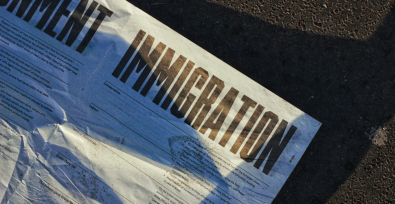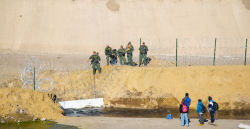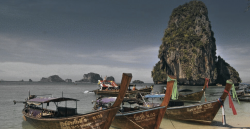Disposable and medical glove manufacturers are thriving as the ongoing coronavirus pandemic has led to unprecedented demand and booming sales.
But in Malaysia—which produces 60 percent of the world’s gloves—little has changed for their workers, who continue to face widespread exploitation and debt bondage.
Top Glove, which with around a quarter of the global market share is the world’s largest supplier, recorded its highest quarterly net profit ever in June and has seen monthly orders climb 180 percent during the pandemic.
Along with its profits, its share price has soared and its founder, Lim Wee Chai, was worth $2.5 billion in June, according to Bloomberg.
However, the boom in Malaysia’s glove industry has also increased scrutiny of the exploitation and forced labor endured by its mainly migrant workforce.
Most foreign laborers at Malaysian glove factories are hired through a system of intermediaries that often charge high recruitment fees, effectively trapping many in debt bondage.
Working conditions in the factories is also difficult and dangerous, involving high temperatures, exposure to harmful chemicals, and excessive noise levels.
Despite years of reportage uncovering these abuses, and despite industry promises to reform, these exploitative conditions remain endemic.
CNN Business reports:
“Many of the serious forced labor indicators identified in the 2019 audits remain systematic within the workplaces of the Malaysian rubber gloves industry,” [labor rights activist Andy Hall] said. And the companies’ remedial actions don’t go far enough, he added.
”Workers hired under so called zero-cost recruitment policies since 2019 are not included, although they often paid considerable fees, nor are workers who already resigned or who were hired before the arbitrary dates set by the companies.”
As a former Top Glove employee, Taha is not eligible to be reimbursed for his recruitment fees. He moved back to Nepal in October 2019 — and is still paying off debt.
“I went to Malaysia to help support my six siblings and parents, but I wasn’t able to set aside any money during my time there and I am still in debt.”
“I’m worse off than before I left.”
The increased scrutiny that has come with the coronavirus pandemic, particularly from U.S. authorities, has put additional pressure on the industry to change.
Some imports from Top Glove were blocked in the U.S. in the July, leading the company and the Malaysian government to scramble to improve its image and take a harder line on forced labor.
The industry is a major contributor to the Malaysian economy, generating billions of dollars in yearly profits, and the U.S. is the world’s biggest importer.
This week, Top Glove appealed to have the ban lifted by U.S. Customs and Border Protection (CBP), submitting a new independent auditor’s report.
Top Glove said in August that it “continues to enhance its migrant workers’ working and living environment and facilities,” adding that new accommodation would be built to replace workers’ often substandard lodgings.
But experts remain skeptical of claims that such systemic issues can be fixed so quickly and easily.






Freedom United is interested in hearing from our community and welcomes relevant, informed comments, advice, and insights that advance the conversation around our campaigns and advocacy. We value inclusivity and respect within our community. To be approved, your comments should be civil.
All fascists to the gibbet!